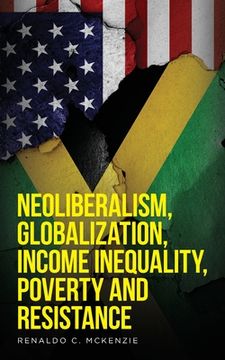Neoliberalism, Globalization, Income Inequality, Poverty and Resistance: Neoliberalism (in English)
Synopsis "Neoliberalism, Globalization, Income Inequality, Poverty and Resistance: Neoliberalism (in English)"
When we hear of Jamaica or the Caribbean, we think of beautiful islands of paradise with sun, sea and sand, reggae music, cannabis, and "irie" people like Usain Bolt- people who are living out their best dreams, desires, and lives. But this book analyzes this motif, given the historical and current economic and political situation in Jamaica and the Caribbean and the "Global South." In an attempt to escape the adverse realities of poverty, inequality, and injustice, the people of the Global South find themselves in north metropolises with very little agency and minimal change to their lives. In fact, except for the use of cleaning neoliberal waste, the immigrant is usually portrayed as an alien with three heads and big sharp teeth seeking to steal and destroy the profit and disrupt society. As such we will discuss Black, brown, and Pan-African struggles for economic prosperity, justice, and freedom and consider efforts, abilities, or inabilities to chart their own futures since decolonization and realize real political independence and economic prosperity. Perhaps, they are charting their own course by the few corrupt of the status quo who are benefiting from partnerships with the neoliberal regime of the "Washington Consensus," advocates of the "bureaucratic phenomenon," while the masses are left behind. John Williamson, the inventor of the term "Washington Consensus," believes the term has two quite different meanings. First is the meaning he gave the term, which involved consensus around a set of ten policy reforms, which he believed were widely accepted as beneficial by economists.The approach will be interdisciplinary and comprehensive, drawing on various disciplines and experiences and going beyond Jamaica to consider the wider Caribbean and the diaspora in the United States. It draws on past and present works on the subject and relies on readers' abilities, knowledge (primary or secondary), and skills to challenge, critically analyze, and develop their own thinking within a Jamaican, Caribbean, its diaspora, and/or American context given this century's challenges and opportunities. This Book is divided into two parts. Part A will examine whether Jamaica's inequality trends from the mid-1970s up to the beginning of the twenty-first century were a consequence of the structural adjustment policies stipulated by the neoliberal technocrats of the Washington Consensus in Jamaica. The study does not only concern itself with Jamaica, but Jamaica provides a case and a context within which to engage the subject matter. Part B will argue, given Jamaica's experience with neoliberal restructuring, that Jamaica-like many former colonies-is far from independent. Further, we will consider the response to the processes of decolonization and globalization that have deepened the realities of the peoples of the Global South and the peoples in the diaspora. There have been hundreds of protests against the Washington Consensus and their lackeys since 1976 by the global justice movement and recently the Black Lives Matter movement in America. Street protests and some degree of violence have been the main strategies of the group until recently. But are the resistance movements closer to achieving their aims? The effectiveness of the resistance will be determined by the extent to which they have realized actual power: "demonstrated change in the desired direction."

